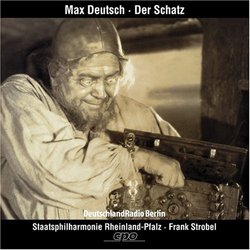| All Artists: Max Deutsch, Frank Strobel, Rheinland-Pfalz Staatsphilharmonie Title: Der Schatz Members Wishing: 0 Total Copies: 0 Label: Cpo Records Release Date: 4/19/2005 Genres: Soundtracks, Classical Style: Symphonies Number of Discs: 1 SwapaCD Credits: 1 UPC: 761203992522 |
Search - Max Deutsch, Frank Strobel, Rheinland-Pfalz Staatsphilharmonie :: Der Schatz
 | Max Deutsch, Frank Strobel, Rheinland-Pfalz Staatsphilharmonie Der Schatz Genres: Soundtracks, Classical |
Larger Image |
CD Details |
CD ReviewsThe First Ever Full-Orchestra Film Score J Scott Morrison | Middlebury VT, USA | 05/05/2005 (3 out of 5 stars) "Someone must have advised composer Max Deutsch (1892-1982) that if you're going to steal, steal from the best, because he certainly did that in this film score from (!) 1923, the oldest (miraculously) extant film score that used a symphony orchestra. A student of Schoenberg, Deutsch obviously had terrific schooling. And he had a good ear, too, because one can hear bits of Mahler (e.g., the trumpet tattoos from his Seventh Symphony, among many other touches), Wagner (the Tristan harmonies), and folksong ('Ach, du lieber Augustin,' which of course Mahler had used, too). And it all sounds like Mahler meets Carl Stallings (you know, the music for the Bugs Bunny cartoons). This issue from cpo is billed as 'A Film Symphony in 5 Acts' but it's no symphony as we generally think of it. It's more like a ballet, perhaps, with short episodes. But, in fact, it is actually simply a film score whose form is determined not by Austro-German classical forms but by the incidents in the silent movie, 'Der Schatz,' one of G. W. Pabst's early silent films. The story is about greed and its results. The film ends with a spectacular collapse of the home of the protagonists and their fiery deaths, divine retribution for their avarice -- certainly opportunity for some Götterdämmerung-like music.
Don't get me wrong. As movie music goes, this is pretty sophisticated stuff. It doesn't hold together as a concert piece, however, and that's pretty much how we have to listen to it. Still, there are some lovely and interesting things in the score. Further, the performance of the Staatsphilharmonie Rheinland-Pfalz (a very good orchestra with whom talented conductors like Ari Rasilainen and Leif Segerstam have been closely associated) under the young Bavarian conductor Frank Strobel is richly detailed and well-recorded. I think this issue is probably only for film music fans, particularly those who are interested in the development of the genre. (Maybe some Mahler enthusiasts might be interested in it, too, since so much of it sounds like a Mahlerian sub-species.) It is certainly amazing how this score, written in 1923, foreshadows much that we recognize as fingerprints of the film-score style that developed over the next seventy years. TT=74:04 Scott Morrison" |
